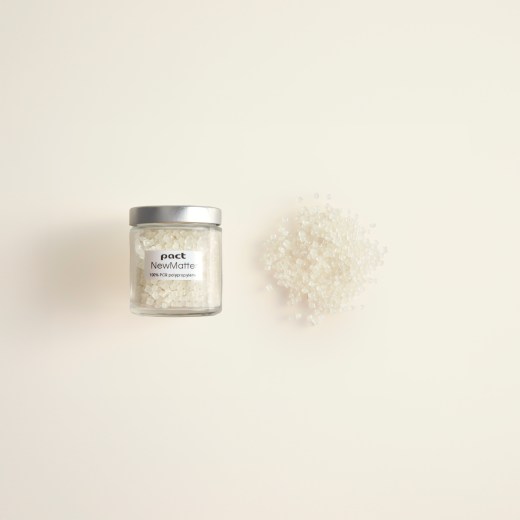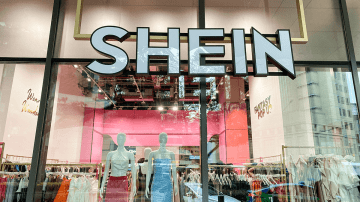It’s no secret that the beauty industry has a pump waste problem. As previously reported by Glossy, the mixed-material pumps commonly found on cleansers, lotions, serums, and a variety of other liquid, gel and cream formulas are notoriously difficult to recycle. This issue has left brands and retailers hungry for a solution that aligns with their values and goals — and created a gap in the packaging marketplace.
On Thursday, Credo, the clean beauty retailer started in 2015, launched a new in-house skin-care range aimed at being the catalyst for industry-wide packaging disruption.
Credo’s new eponymous line was created with pumps made with Pact Collective, a nonprofit focused on reducing beauty packaging waste that was launched as an experiment between Credo Beauty and clean cosmetics brand MOB Beauty in 2021. In a few short years, Pact has become the go-to recycler for beauty brands like L’Oréal USA, Fenty Beauty, Caliray, Ceremonia and Summer Fridays, as well as retailers like Sephora, Ulta Beauty, Detox Market and COS Bar.
“We’re actually able to use the material collected through Pact collection bins across the U.S. and Canada [to make the pumps],” Carly Snider, executive director of Pact Collective, told Glossy. “This has been years in the making and kind of the goal of Pact itself. … We’re trying to bring the industry together to provide a pre-competitive approach to collecting as much beauty empties as we possibly can in this effort to give it back to beauty and upcycle it again.”
The premise of this new project is simple: Beauty empties are collected by Pact’s 3,200 bins and 55 mail-back programs before being sorted and, when possible, recycled. Hard-to-recycle items are then used to make NewMatter’s new PP resin. To reach the quantity needed to launch this line, ocean-bound plastic collected in Malaysia supplemented the volume requirements. This resin is used to create the new pumps, which can be recycled many times over due to their mono-material structure. In total, the pumps are made from 84% recycled materials.
Pact works with a variety of manufacturers to create the resin and, for this project, the pumps were made by Roberts Manufacturing, a packaging manufacturer based in Southern California.

A case study published on Thursday by Pact looked at 500 kilograms of polypropylene (PP) beauty packaging collected through the Pact U.S. collection system, with an additional 2,500 kg of PP ocean-bound plastic collected in Malaysia. Within this sample size, NewMatter found it has saved 68 cubic meters of landfill space and 521 gallons of gasoline during its production, versus averages found in virgin plastic production. The study also found that this launch saved 4,632 kg of CO2e, which is about the equivalent of the carbon sequestered by 115 trees over the course of a year.
As it pertains to just this new Credo launch, Pact found that the first run of pumps saved one pound of material from going to a landfill or ocean for every 38 pumps created.
Credo’s new in-house line was inspired by the top goal among its shoppers: hydration. The line is launching with two cleansers and four moisturizers priced at $44 and $64, respectively. The products are sold in recycled glass packaging and FSC-certified paper boxes.
“When we first started Credo, the intention was always to have an in-house skin-care brand and open stores,” Annie Jackson, CEO and co-founder of Credo Beauty, told Glossy. But after surveying the brands that fit into this new clean concept store, the team decided to pause. “Honestly, there’s nothing that we could do [that was] any more than those brands could, so we really just decided to focus on opening stores and just celebrating these brands and these founders.”
A decade later, armed with the power of the recycled pump, as well as a new system in place to bring this innovation to the industry, Jackson revisited her initial goal.
“For us to have 10 years of history … with these great and intimate relationships with our customers, we were able to gain all this intel,” Jackson said. “[Now we can] curate ingredient-by-ingredient to answer our customers’ concerns.”
The entire line is framed around upcycled vetiver root, which is said to protect the skin’s microbiome and amplify hydration, and gives each product a botanical scent. “We call it a little wonder grass,” Jackson said. “It protects the skin barrier, improves skin texture, reduces pore size and benefits [an] anti-aging [routine].”
Each product also falls into one of four secondary franchises. For example, the franchises True Timeout and Deep Thirst, which each feature a cleanser and moisturizer, are expected to be the hero SKUs. They include calming botanicals and hyaluronic acid, respectively, as well as a laundry list of other ingredients. Also included are one-off moisturizers branded as Rewinder and Radiance Rising, which include the retinol-alternative ingredient bakuchiol and vitamin C, respectively.
Other ingredients featured include peptides, caper fruit extract, balloon vine, sodium PCA, aloe leaf juice, babassu oil, northern truffle root extract and sunflower, among others, as well as pre- and post-biotics like chicory root inulin and lactobacillus extract.
In clinical trials published Thursday, Credo found that 31% of users found immediate improvement in hydration and 27% found improvement in hydration after 24 hours. As far as consumer perception, the team found that 96% of users agreed their skin felt softer and looked replenished 24 hours after application.
Credo Beauty currently has 15 brick-and-mortar stores that sell 120 leading clean beauty brands. It also owns two other in-house lines: Follain skincare and Exa Beauty color cosmetics. It recently sunset EleVen by Venus Williams, a sunscreen line it owned in partnership with the tennis star.
As for brands that want to explore this new option, “Brands can either purchase this pump [for their products] or they can just use the material to create their own,” said Jackson. Looking toward the future, Jackson hopes to spur change across the industry. “If we can use [this launch] as a vehicle to have this conversation and we get this pump out there, then that [reflects] the goal of the Credo brands: to be the poster children [for the industry] in different ways.”




